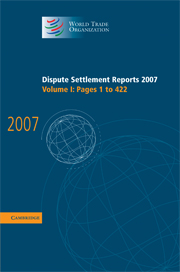United States – Measures Relating to Zeroing and Sunset Reviews (WT/DS322): Report of the Appellate Body
Published online by Cambridge University Press: 13 December 2017
Summary
INTRODUCTION
Japan and the United States each appeals certain issues of law and legal interpretations developed in the Panel Report, United States – Measures Relating to Zeroing and Sunset Reviews (the “Panel Report”). The Panel was established to consider a complaint by Japan concerning the calculation of margins of dumping by the United States based on a methodology that disregards the amounts by which the export prices are above the normal value in certain transactions.
Before the Panel, Japan challenged, under the Agreement on Implementation of Article VI of the General Agreement on Tariffs and Trade 1994 (the “Anti-Dumping Agreement”), the General Agreement on Tariffs and Trade 1994 (the “GATT 1994”), and the Marrakesh Agreement Establishing the World Trade Organization (the “WTO Agreement”):
(a) the United States’ “zeroing procedures” and the “standard zeroing line”, “as such”, in the context of “original investigations”, “periodic reviews”, “new shipper reviews”, “changed circumstances reviews”, and “sunset reviews”; and
(b) the application of the “zeroing procedures” in one “original investigation”, in 11 “periodic reviews”, and in two “sunset reviews”.
In the Panel Report, circulated to Members of the World Trade Organization (the “WTO”) on 20 September 2006, the Panel made the following findings in respect of “model zeroing” and “simple zeroing”:
(a) By maintaining model zeroing procedures in the context of original investigations, the United States Department of Commerce (the “USDOC”) acts inconsistently with Article 2.4.2 of the Anti- Dumping Agreement.
(b) By using model zeroing in the anti-dumping investigation of imports of cut-to-length carbon quality steel products from Japan, the USDOC acted inconsistently with Article 2.4.2 of the Anti- Dumping Agreement.
(c) By maintaining simple zeroing procedures in the context of original investigations, the USDOC does not act inconsistently with Articles 1, 2.1, 2.4, 2.4.2, 3.1-3.5, 5.8, and 18.4 of the Anti- Dumping Agreement, Articles VI:1 and VI:2 of the GATT 1994, and Article XVI:4 of the WTO Agreement.
(d) By maintaining simple zeroing procedures in the context of periodic reviews and new shipper reviews, the USDOC does not act inconsistently with Articles 1, 2.1, 2.4, 2.4.2, 9.1-9.3, 9.5, and 18.4 of the Anti-Dumping Agreement, Articles VI:1 and VI:2 of the GATT 1994, and Article XVI:4 of the WTO Agreement.
- Type
- Chapter
- Information
- Dispute Settlement Reports 2007 , pp. 3 - 96Publisher: Cambridge University PressPrint publication year: 2009
- 1
- Cited by



